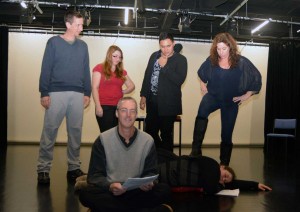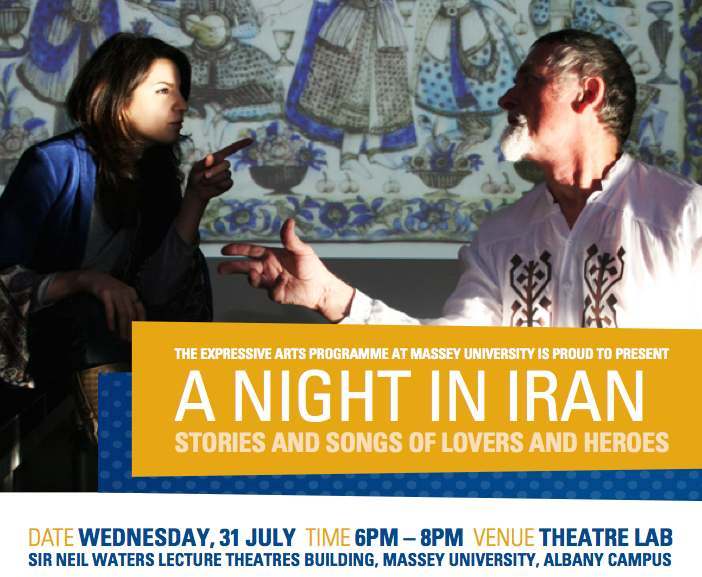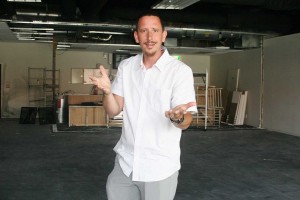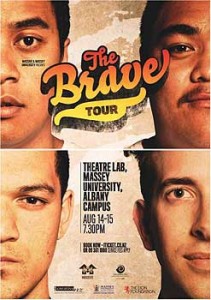Dr Steven Taylor and poses in front of Massey theatre students acting out the final scene of The Invisible Foot’.
‘Invisible Foot’ kick-starts workplace theatre at Massey
Massey University’s theatre and business programmes came together for a unique performance last week – a reading of a play that was never meant to be performed on stage. Called The Invisible Foot, the 40-minute piece was written by business academic and playwright Associate Professor Steven Taylor, who is currently visiting Massey University with the Fulbright Specialist Programme. Dr Taylor specialises in organisational theatre – the performing of plays in workplaces to effect transformational change. While this is a relatively new concept in New Zealand, it has a long established following elsewhere, especially in Europe. The idea, he says, is to get people thinking about aspects of the world of work in a different way.
“I see the plays as a way of opening up a conversation about things that we usually take for granted or don’t think about,” he says. “My hope is that the images and metaphors in the play stick with people and provide them with a way to talk and think about aspects of their lives that they may want to change.
“For example, I’d be delighted if a year after seeing The Invisible Foot someone said at a meeting, ‘there it is, the invisible foot of the market kicking us in the backside’, and that started a different sort of conversation about what the organisation might do.”
The Invisible Foot explores the relationship between capitalism and Christianity and critiques the business world’s addiction to growth. Students from Massey’s theatre studies programme had only a few hours to familiarise themselves with the text before performing a reading of the play in the university’s new Theatre Lab performing arts space.
Dr Taylor says when his plays are performed in workplaces he usually gets “a fair amount of laughter and knowing nods” and a lot of good discussion. The spirited reading of The Invisible Foot at Massey certainly elicited plenty of chuckles from an audience who appreciated its critique of the underlying reasons for the global financial crisis. After the performance, a panel discussion with business and arts academics and industry representatives explored the uses for workplace theatre in New Zealand. Panel member and The Warehouse general manager of human resources Anna Campbell said that she believed there was a place for theatre in organisations as long as it was used pragmatically. She went on to describe how The Warehouse uses actors as a part of its customer service training programme.
“While it’s a structured training programme, the people delivering it are improvisers and actors and it’s been hugely successful. Improvisation helps staff bring very real situations to life but in a non-threatening way. It gets them to take stock and think, ‘Oh my God, we do that to our customers, that’s really shocking.’ We wouldn’t get the same results if we stood in front of them and lectured them.”
The similarities in the skill sets of actors and good leaders was also discussed, and several members of the audience shared their accounts of being mentored or “directed” by good managers and learning to “act” in leadership roles and connect authentically with others. The performance of The Invisible Foot is just one of several workshops that will be run by Dr Taylor during his month-long stay in New Zealand. He has already worked with PhD candidate Kate Blackwood to start turning her research data on workplace bullying in hospitals into a play.
“With my New Zealand workshops I hope people will come away with some idea of the possibilities of how we can use the arts in organisations – and maybe even be a little inspired to do so,” he says.
Massey senior lecturer Dr Ralph Bathurst, who secured the Fulbright scholarship to bring Dr Taylor to New Zealand, said he hopes Dr Taylor’s visit will be the first step towards Massey embracing theatre to understand and discuss organisational behaviour.
“My longer-term plan is to bring our business and theatre programmes together to offer a troupe to go into organisations and be involved in professional development,” he says. “I’d also like students to consider turning their research into a play – that’s much more accessible than a dissertation that sits on the library shelf and never gets read.”



